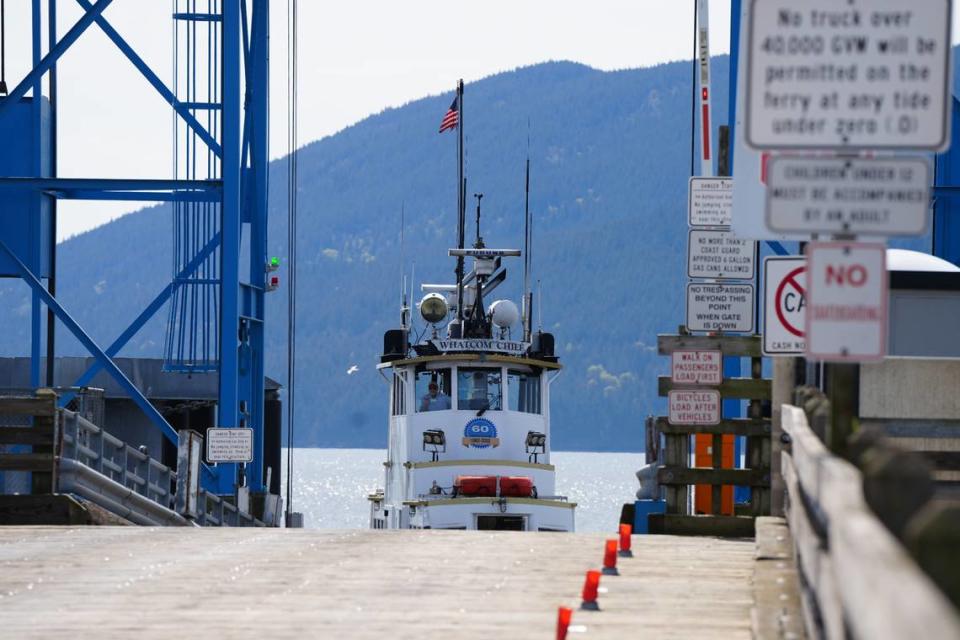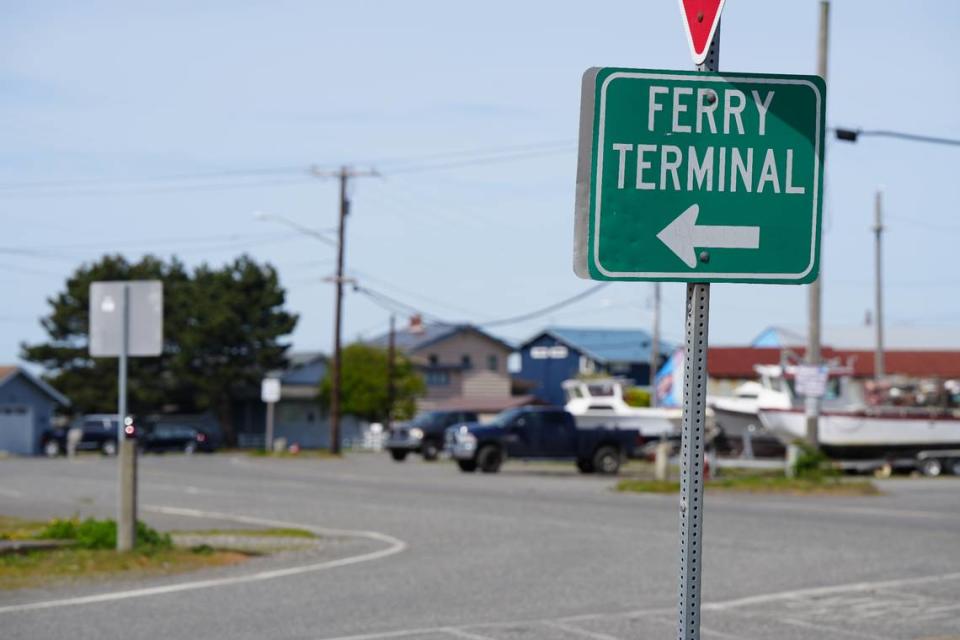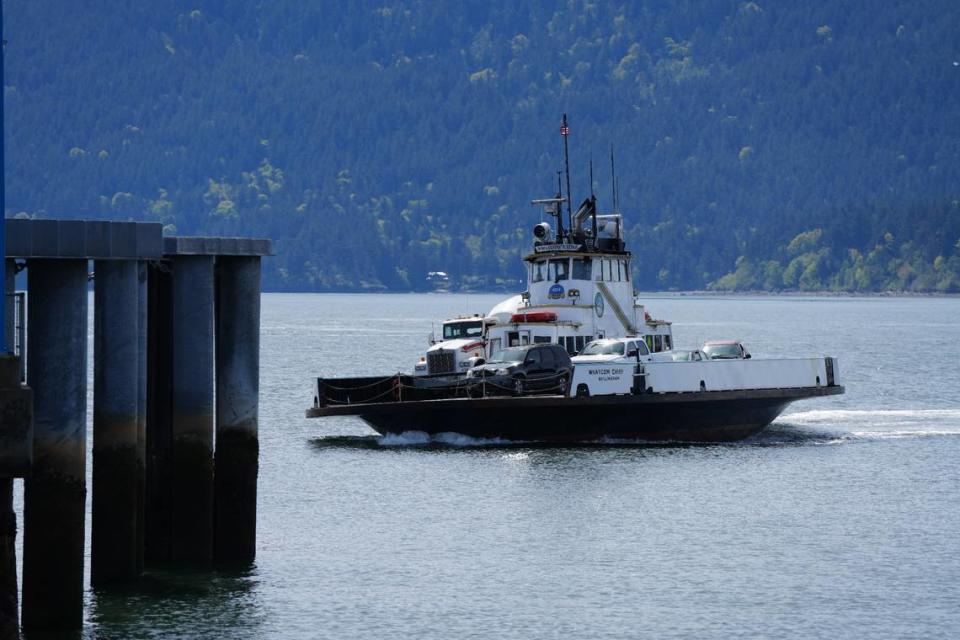Lummi Island ferry rate hike starts June 1, while lawsuit over increase heads to trial
In the Spotlight is a Bellingham Herald series that digs into the high-profile local issues that readers care most about. Story idea? Email newsroom@bellinghamherald.com.
A pending Lummi Island ferry rate hike will be allowed to take effect June 1, while a lawsuit filed by an island resident seeking to stop the fare increase will head to trial in several months.
At a hearing Wednesday, May 22 in Whatcom County Superior Court, Judge Evan Jones did not issue a ruling on whether to grant a preliminary injunction, which would have stopped the fare increase from taking effect next weekend. Instead, Jones reserved a ruling on an injunction, consolidated all of the issues raised by the resident’s lawsuit and directed both attorneys to proceed to a trial on the merits.
The trial will happen on an expedited basis, meaning it will occur more quickly than normal. A trial date will be set by the end of the week, Jones said in court Wednesday. The trial is likely to be set for sometime this fall or winter.
Lummi Island resident Peter G. Earle filed a lawsuit April 16 in Whatcom County Superior Court against Whatcom County Executive Satpal Sidhu, Public Works Department Director Elizabeth Kosa, and Whatcom County seeking to stop Sidhu’s recent executive order raising ferry rates from taking effect June 1.
Earle had sought a preliminary injunction to stop the fare increase for the Whatcom Chief, the ferry that carries cars and pedestrians on the 8-minute ride across Hale Passage between Lummi Island and Lummi Nation, The Bellingham Herald previously reported.
The ferry is the only access to the mainland for most of the island’s 934 residents, in addition to tourists, Whatcom Medic One ambulances and other service providers.

Earle’s lawsuit
Earle, who is acting as his own counsel, claims that county officials were incorrectly calculating the costs that they were using to justify the fare increase by illegally including emergency repairs and tideland lease costs.
Whatcom County’s code requires ferry fare payers to generate sufficient revenue on an annual basis that covers 55% of the ferry’s operating costs, as defined in the county code, and is known as the ferry fare box.
Earle’s lawsuit claims the county violated the county charter and codes by including nearly $800,000 in emergency repairs and expansions to the Lummi Island ferry’s dolphins as operating costs in the ferry fare box. Dolphins are a group of pilings that can serve as a stabilization or mooring point for a dock, bridge or other waterway structure.
Earle’s lawsuit also claims that the county violated its own charter since 2011 by including the monthly real estate leasing costs the county pays to the Lummi Nation for the tidelands the Lummi Island ferry system is on as operating costs in the ferry fare box, according to court records.
Earle’s lawsuit alleges that including both the emergency repair and leasing costs as operating costs, rather than as capital costs, was incorrect and illegal, and was the justification for the ferry rate hikes.
Earle’s lawsuit sought both a temporary and permanent injunction to stop the ferry fare increases from going into effect. He also is seeking a court order that would prohibit the county from charging anything other than “regular and routine” maintenance as operating costs; that the county violated its code by including the emergency dolphin repair costs of $781,923.77; that the county violated its charter by not including the monthly tideland lease payments in its capital budget and that any costs erroneously included as operating costs since Jan. 1, 2011 be reclassified as capital costs, according to court records.
Earle had asked the court to stop the fare increases from going into effect until the issues surrounding the emergency repairs and monthly lease costs are resolved.
Earle is a semi-retired attorney who is licensed to practice in Wisconsin and has done work in California, Rhode Island and Illinois. He gave a presentation to the Bellingham City Club in 2018 about his work on the Wisconsin gerrymandering case. He was also involved in the California case requiring paint makers to fund a remediation program to remove lead paint from hundreds of thousands of homes.
Response to lawsuit
In its May 7 response to Earle’s lawsuit, the county, executive and public works director denied that the county violated its own charter and codes; that it incorrectly included the dolphin repairs and tideland lease costs in the ferry fare box or that including those costs has distorted the calculations of the percentages of total revenue generated through ferry user fees.
The county admitted in its response that at the time Earle filed his lawsuit, the code language he cited was correct and current. Since that time however, the code language has changed and now includes both the tideland lease costs and any non-capital emergency maintenance and repairs to the terminal structures, such as the dolphins, as operating costs to be included in the ferry fare box. The amendments to the county code governing ferry rates and expenditures were approved at the Whatcom County Council’s April 23 meeting.
Because the county code has changed, a court no longer needs to determine and declare the meaning of the words “actual regular and routine maintenance,” which Earle’s lawsuit takes issue with, the county’s lawsuit response states.
The court also no longer needs to determine whether the tideland lease costs were illegal and should have been included in the county’s capital budget instead of included as operating costs in the ferry fare box, because of the code changes, the county’s response claims.
The county also denied that Earle and other ferry fare payers would suffer “irreparable pecuniary injury” if the ferry rate hikes were to take effect, or that Earle had standing to bring a lawsuit over the rate increases.
Earle is not considered a member of a protected class and cannot be considered one, because the ferry benefits the general public, the county’s response states.
The county asked that Earle’s lawsuit be dismissed with prejudice, meaning it could not be brought back to court, and that any request for a temporary or permanent injunction be denied.

Fare increase
Whatcom County Council members adopted a resolution in mid-March that directed the county executive to issue an executive order increasing Lummi Island ferry fares due to a projected budget deficit of more than $400,000.
Earle’s lawsuit has alleged the projected budget deficit has been incorrectly calculated, because it includes the emergency dolphin repairs and reconstruction costs as operating costs, rather than as capital costs. Earle reiterated these arguments at the court hearing Wednesday afternoon.
According to Sidhu’s executive order, dated March 28 and updated April 1, there were errors in a 2022 analysis of the code concerning fare box revenue needs and calculations, and “confusion in the calculation extending back to 2006.” The analysis “highlighted the need for greater clarity in the definitions and calculations used to determine ferry rates” and led to a rewrite of code sections regarding fare calculation methods.
Whatcom County Council members discussed the ferry fare rates in a morning committee meeting April 23, before ultimately unanimously approving them that evening following a public hearing, The Herald previously reported.
Current ferry rates start at $8 for a round trip for a car passenger, or someone on foot or a bike, rising to $33 for a driver and the average car or light-duty truck. Heavier trucks and RVs cost more.
The fare changes taking effect June 1 include a $1 increase in the cost of a regular vehicle and driver ticket, a reduction of discounts offered through the multi-ride punch cards, and a 30% increase in fares for heavy vehicles.
The Whatcom Chief was built in 1962 and can carry 100 passengers and 20 cars. Ridership in 2023 was 178,183 passengers, according to Whatcom County data.
A replacement ferry is planned and has received $35 million in state and federal grant funding.
Wednesday’s hearing
At Wednesday’s hearing, Earle refuted the county’s arguments that he lacked standing to bring a lawsuit over the ferry rate increases.
Citing a recent Washington State Supreme Court ruling that dealt with the issue of standing, Earle argued that not only himself as a Lummi Island resident, but all other Lummi Island community members and other ferry fare payers would suffer “specific injury” on a continuing basis if the rate increases were to take effect. Because Earle is an actual injured party, he has standing to bring a lawsuit, he argued.
Earle said the Lummi Island ferry, which was originally operated by a private business and was then sold to the county in the early 1920s, exists for the sole purpose of ferrying people between Lummi Island and the Whatcom County mainland. It does not serve as a transit point to anywhere else, he said. Because of this, ferry fare payers and Lummi Island residents are a well-defined group of people who will be affected by the fare increases and the ways in which those increases are calculated, he said.
Earle also argued that the county, including both the county executive and public works director, have acknowledged on more than one occasion that the dolphin repairs at the center of Earle’s lawsuit were not routine maintenance and that they were expensive emergency repairs made in an attempt to extend their service life, and that they should not have been included as operating costs. He said that county officials have also acknowledged the issues surrounding the tideland lease payments.
Earle alleged that multiple county officials knowingly violated the law, county codes and charter by including the repairs and tideland lease payments as operating costs and by then using those costs to calculate the ferry rate increase.
Earle also argued that the county did not address those allegations in its response to his lawsuit.
“This has resulted in more than $3 million of inflationary padding put into a fare box that directly resulted in pecuniary harm to every islander,” Earle said Wednesday.
Whatcom County Civil Deputy Prosecuting Attorney Jesse Corkern, who is representing the county, executive and public works director, said there was nothing in the county codes or charter that defined a special relationship between the Lummi Island ferry and Lummi Island residents.
Corkern said regardless of whether a person is a Lummi Island resident or a Pierce County resident, they would pay the same ferry fare rate. The increase taking effect next weekend does not affect Lummi Island residents any differently than any other ferry rate payer, he said. Because of this, Earle and other Lummi Island residents cannot be considered a protected class, Corkern argued.
Corkern also argued that Earle and other residents cannot show that they are suffering individualized and particular harm caused by the ferry rate hike.
“Mr. Earle cannot establish that. Just because he lives on the island does not make that individualized and particularized to him because the code does not treat the ferry increase any differently as it pertains to any other rate fare payer,” Corkern said Wednesday.
Corkern also argued that Earle has not yet suffered any potential injury because the ferry rate increase does not take effect until June 1.
Corkern argued that one of the remedies Earle is seeking, declaratory judgment or relief, is available when a person wants clarification on their legal status or rights that are affected by an ordinance or statute. Because Earle cannot show any rights that have been infringed upon by the passing of the ferry rate increases, he is not entitled to such relief, Corkern said.
“Declaratory relief is not intended to be a vehicle for a citizen to interject themselves into the day to day operational decisions of your local government because they don’t like the definition of an accounting term. Mr. Earle has to establish some kind of legal status or right that is affected by the ordinance and he is failing to do that,” Corkern argued.

Corkern also said he didn’t believe that the county charter section Earle alleges the county has violated is a directive to the county or its public works department to account for the tideland lease payments in any particular way. Corkern argued that the intent of the county charter’s section on illegal contracts was to make sure contracts the county entered into, especially those that dealt with land leases, were reflected in the county budget and known to the public. The section is not a directive to account for those as a capital expenses versus operating expenses, Corkern argued.
Corkern said the court must balance the public interest, and that the public interest in having a well-maintained ferry and balanced budget in the public works department outweighs any harm caused to Earle by the ferry rate increases.
In response to Corkern’s arguments, Earle said the county still has not addressed the two major allegations raised in his lawsuit — that it violated “the black letter wording” of the county code and charter by including the dolphin repair and tidelands lease costs in the ferry fare box.
Earle argued the repair costs were not regular and routine maintenance and that the public works department classifying them as such was done in a “manner that’s incredibly abhorrent” in relation to all other prior maintenance costs.
“They don’t address that,” Earle said in referring the code and charter violations allegations. “There’s a lot of gloss here, but very little substance.”
Earle said he also wanted to be sure the court grasped the context of the actual injury to ferry fare payers alleged in his lawsuit. Earle said Lummi Island residents are not disputing that they are required to pay 55% of the ferry’s operating costs, but said he and other island residents are arguing that the way that 55% is being calculated is incorrect.
Earle said island residents and a county ferry advisory committee requested the county and public works department recalculate the ferry fare box balance both with and without the dolphin repair costs included to determine if the fare box was running a deficit. In response to the committee’s request, the county only supplied the total costs of the dolphin repairs, but did not recalculate the ferry fare box balance without those costs as requested, Earle said. Because of this, Earle said it’s not possible to determine if the fare box would be running a deficit without the dolphin repairs and tideland lease costs included.
And that deficit, he argued, is part of what’s driving the ferry rate increase.
“Logic demands that if you credit the fare box $3.4 to $3.6 million, which is the range of (the costs), that we would not have a deficit and the entire fare increase exists only because they claim there’s a deficit,” Earle argued.
Merits of the case
Jones, the judge, said Wednesday that civil court rules governing injunctions allowed him to order a trial on the merits of the case.
After more than an hour of arguments, Jones said he believed the merits can and should be heard, and that it was important to get these issues resolved. By having a trial on the merits of the case, Jones said that would help inform a judge or jury as to whether a permanent injunction should be granted barring the current ferry rate increase.
Jones declined to issue a temporary stay that would have barred the rate increase from taking effect, but said in seeking declaratory relief, Earle can present arguments at trial to seek potential damages.

